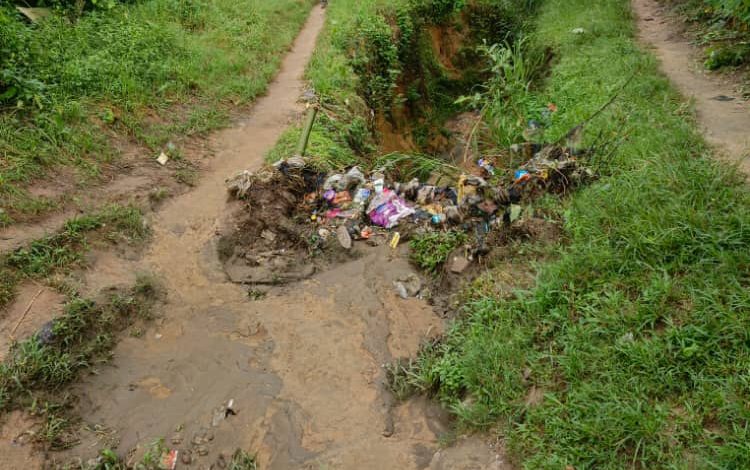
Akwa Ibom State is experiencing heavy rainfall, causing disastrous consequences for the Ekpri Nsukara Offot Community in the Uyo Local Government Area.
The rampaging flood, which has taken a serious toll on the indigenes of the community located along the Nwaniba axis of Uyo Capital City, has already claimed the life of a four-year-old girl who drowned recently.
Spirited efforts made to rescue the toddler were unsuccessful, as the child tragically lost her life, causing unending mourning in her family and the community in general.
Apart from the unfortunate incident, the community is also severely in danger, as their road network is impassable and their houses are on the brink of collapsing due to the devastating impact of the rampant erosion.
The flood has critically affected the community’s extensive farmlands by turning them into idle water-logged pools, with no possibility of these lands being used for cultivation except when construction work commences to channel out the rainwater and restore the massive land to its productive stage.
Furthermore, the indigenes are also decrying some institutions in the community, especially their community-owned Ekpri Nsukara Offot International Schools (ENISCO), which is under serious threat of destruction as a result of the heavy downfall of rain in the state.
Related: Eteidung Asikpo Sends SOS To Gov Eno As Erosion Menace Worsens In Ekpri Nsukara Offot
Speaking to journalists about the ugly incident, the village head of Ekpri Nsukara Offot, Eteidung Emem Denis Asikpo, lamented the risk of serious environmental health hazards on the wellbeing of indigenes in his community if there is no immediate intervention from the state government to address this devastating havoc.

Village Head, Ekpri Nsukara Offot, Uyo
Narrating the havoc wrecked on the community, he said, “It is a very sad situation, as we have been suffering from the consequences of the erosion for some years now, especially whenever the rainy season begins.
“Some streets in our community, like Akpakpan Street, off Mission Road and other adjoining streets, are cut off. Residents can’t access their houses with cars or motorcycles any longer. Some fences around properties and houses have either been destroyed or flooded, while farmland is being submerged. Residents in the affected areas do face great risk in navigating to their houses when it rains, especially at night.
“Ekpri Nsukara Offot, which is situated along the Nwaniba Road axis of Uyo Capital City and is a co-host of the University of Uyo (UNIUYO), is facing the threat of potential gully erosion with its dire consequences of land degradation and environmental insecurity.
However, the Ekpri Nsukara Offot community has called on the state government to come to their aid so their lives, houses and other properties can be protected from further destruction.
This recent tragedy is just one of the numerous dangers that erosion can inflict on a community if urgent intervention is not taken to mitigate further damage.
There are several reports gathered on how erosion is the world’s most serious environmental problem, which can affect a nation’s agricultural productivity, sustainability, and management for food security and sustenance.
Read Also: Oku Ibom Ibibio Seeks Dispassionate Action Against Deforestation
According to the World Bank, the soil erosion crisis has accelerated alarmingly in recent decades, and it is now threatening about 6,000 square kilometres, or nearly six percent of Nigeria’s land mass.
According to reports from experts, climate change is seen as the major cause of intense downpours, which aggravate erosion and cause more damaging factors in communities.
An erosion expert, Benedict Unagwu, who spoke on Climate Home News, said climate change affects rainfall intensity and distribution, and this poses a serious erosion threat, particularly in areas that are prone to erosion.
Meanwhile, in 2021, the Akwa Ibom State Commissioner for Environment, Charles Udoh, told the News Agency of Nigeria (NAN) that the state government had spent N10 billion on erosion control projects to mitigate the effects of the natural disaster.
He noted that more cities in Akwa Ibom are prone to gully erosion due to the natural topography and soil texture in those locations, and the state government was seeking intervention from ecological funds to tackle this erosion menace in the state.
However, to tackle these environmental problems, there is a need for the indigenes of Akwa Ibom State to cultivate the habit of planting more trees, grasses, and other vegetation that will help hold soil in place and reduce erosion. In addition, there is a need for drainage management where runoff water is channelled through culverts and storm drains, which will in turn reduce erosion.
The state government can establish strong environmental laws and collaborate with local governments to implement these erosion control policies and programmes. Also, seek ecological funds from international bodies to avoid more environmental disasters in the state.
Furthermore, there is a need for increased awareness by relevant environmental agencies in the state, particularly the communities, so that lives and properties can be protected from further damage from rampant erosion.




